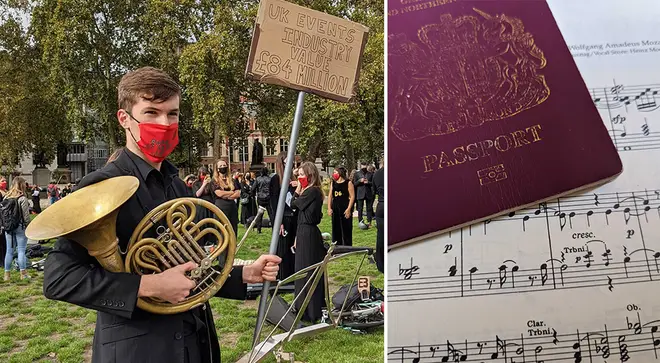On Air Now
Relaxing Evenings with Zeb Soanes 7pm - 10pm
9 February 2021, 12:35 | Updated: 9 February 2021, 12:51

A Labour MP countered it will be a ‘devastating act of self-harm’ if the government does not renegotiate on visa-free travel for musicians.
Minister for Digital and Culture, Caroline Dinenage, has said the EU’s offer of visa-free travel for UK musicians and other sectors was “simply not consistent with the manifesto commitment to take back control of our borders”.
Seeking to clarify the alleged “blame game” between the UK and EU, Dinenage said the EU’s offer of visa-free travel for a range of other sectors was “not consistent with the idea of Brexit that the majority of people in this country voted for”.
Dinenage said the government “fully recognises the importance of touring for musicians”, adding that the negotiating team pushed for freedom of movement for artists, due to the importance of music to the UK economy.
She labelled the outcome of the negotiations “deeply regrettable”, adding that “our door remains 100 percent open… should the EU should change its mind.”
Several MPs and arts heads spoke at the virtual debate on arrangements for touring professionals post-Brexit, following weeks of musicians and arts heads sounding the alarm on the devastating impact of visas and red tape for UK artists.
“If the government doesn’t fix this, it will be a devastating act of self-harm,” Labour MP Kevin Brennan said, citing Britain’s most famous music act: “Surely, as the Beatles said, we can work it out.”
Brennan added this is not an immigration issue, so a reciprocal short-term gig deal with the EU “should be possible”.
Read more: ‘Brexit deal will destroy our industry’ – musicians on EU visa struggle >

E-petition relating to arrangements for UK touring professionals in the EU - 8 February 2021
The ‘soft power’ of Britain’s arts and culture sector, which contributed almost £35bn to the UK economy in 2019, was also raised.
“We must ensure that our domestic talent can continue to access opportunities in the EU,” Chairman of the APPG for Theatre, Giles Watling, said. “It is a great source of soft power. We have lost an entire continent as a venue.”
It was argued that emerging artists will suffer the most, with Labour MP Kerry McCarthy saying “edgy, weirder, more exploratory” acts will be hit hardest by red tape and costs.
Yesterday, horn player Anneke Scott told Classic FM: “What reason would an EU ensemble have to go the extra mile to book an unknown young [UK] musician, when they have plenty of other young musicians equally needing to get their feet on the first rung of the ladder but without the extra bureaucratic requirements and risks?”
MP David Warburton brought up the issue of carnets, urging for government confirmation that individual artists carrying musical instruments won’t need to buy a carnet to enter the EU.
London-based MP Nickie Aiken said world-leading ensembles like the London Symphony Orchestra will face new, post-Brexit cabotage rules, which will make transporting instruments and equipment around the EU much more difficult.
Read more: British musicians ‘shamefully failed by government’ over EU visa issue >

Let Music Live protest on London's Parliament Square
“Right across the creative industries, people are worried,” said MP Alison McGovern, who also called on Dinenage to provide clarity and Dowden to help resolve the issues. “Being a British passport holder just became a disadvantage!”
Labour MP Harriet Harman added: “This is not a Covid problem... or a Brexit teething problem, it will endure if we don’t get it sorted out.
“Every individual musician and organisation says the same... the only aim is to ensure musicians can tour in the EU without hindrance.”
Dinenage repeated culture secretary Oliver Dowden’s statement that the UK had put forward, in consultation with music bodies, an “ambitious” proposal that would have added musicians and crew to the short-term business visitors list, meaning work permits would not be necessary. She reiterated that the EU “rejected” the proposal.
The Musicians’ Union, which represents and protects the rights of 32,000 UK musicians, has pledged to persuade the UK government to return to the negotiating table, and to “work with European colleagues to pressure the EU to do the same”.
The body also says it will work with individual EU countries to agree measures to make touring easier for musicians.